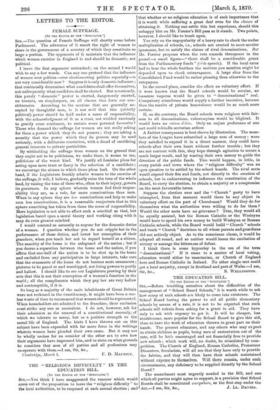LETTERS TO THE EDITOR.
FEMALE SUFFRAGE.
rro THE EDITOR OF THE "SPECTATOR:'] SIR,—The question of Female Suffrage will shortly come before Parliament. The advocates of it assert the right of women to share in the government of a country of which they constitute so large a portion. The opponents of it maintain that the influence which women exercise in England is and should be domestic, not political.
I leave the first argument untouched ; on the second I would wish to say a few words. Can any one pretend that the influence of women over politics—over electioneering politics especially—is not very considerable now ? Suppose it is only domestic influence ; that continually determines what candidates shall offer themselves, not unfrequently what candidate shall be elected. But notoriously, this purely "domestic" power is exerted, dangerously exerted, on tenants, on shopkeepers, on all classes that form our con- stituencies. According to the maxims that are generally ac- cepted by thoughtful men, is it not well that this (strictly political) power should be held under a sense of responsibility, with the acknowledgment of it as a trust, not wielded carelessly to gratify some sentiment, to sustain some personal favourite ? Those who demand the suffrage for women are not really asking for them a power which they do not possess ; they are asking a security that the power which they do possess may be used seriously, with a deliberate conviction, with a dread of sacrificing general interests to private partialities.
By withholding the suffrage from women on the ground that they ought not to be politicians, we make them, it seems to me, politicians of the worst kind. We justify all feminine pleas for acting upon mere trust or fancy in the selection of a candidate ; we encourage the abuses to which those pleas lead. On the other hand, if the Legislature frankly admits women to the exercise of the suffrage, it will, I believe, gradually raise the tone of the whole land, by raising the tone of those who, often to their injury, govern its governors. In any sphere wherein women feel their respon- sibility they are, as a rule, far more conscientious than men. When in any sphere they are less conscientious and help to make men less conscientious, it is a reasonable conjecture that in this sphere something has taken from them the sense of responsibility. Mere legislation is not able to effect such a mischief as that, but legislation based upon a moral theory and working along with it may do even greater mischief.
I would contend as earnestly as anyone for the domestic duties of a woman. I question whether you do not cripple her in the performance of these duties, and lower her conception of their grandeur, when you teach her not to regard herself as a citizen. The sanctity of the home is the safeguard of the nation ; but if you decree a separation between the home and the nation, if you affirm that one-half of the nation is to be shut up in the home and excluded from any participation in large interests, take care that the ornaments of the home do not become mere ornaments ; pictures to be gazed at and worshipped, not living powers to purify and hallow. I should like to see our Legislature proving by their acts that this is not their conception of a woman's function in the world ; all the compliments which they pay her are very hollow and contemptible, if it is.
So long as a majority of the male inhabitants of Great Britain were not reckoned in the constituency, it might have been a use- less waste of time to recommend that women should be represented. When householders are admitted to the franchise, their exclusion must strike any one as anomalous. I do not, however, ask for their admission as the removal of a constitutional anomaly, of which we tolerate so many, but as a positive strength to the moral life of England. The hints I have thrown out on this subject have been expanded with far more force in the writings wherein women have pleaded their own cause. But it may not be wholly useless for an outsider of the other sex to own how their arguments have impressed him, and to state on what grounds he considers that men of all parties and all professions may co-operate with them.—I am, Sir, &c.,
Cambridge, March 1. F. D. MAURICE.


































 Previous page
Previous page